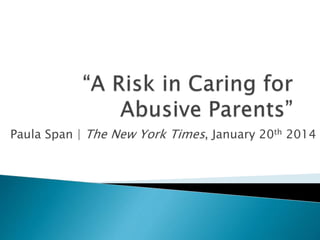
caring for abusive parents
- 1. Paula Span | The New York Times, January 20th 2014
- 2. “Adam from Phoenix spent his childhood traumatized by his parents’ abuse. ‘They remain unapologetic, and I’d gladly let them rot if they one day could not fend for themselves,’ he wrote. Yet we also heard from people who had agreed to become caregivers even if their parents had been, or remained, abusive. ‘I live by a moral code,” said Minerva from New York City, who cared for her alcoholic and bipolar mother. “It was my responsibility and I stepped up to the plate.’”
- 3. Helen S. from Connecticut supervised her angry, meddlesome mother’s care and had lunch with her nearly every Sunday until she died. “I felt I had done the decent thing, and it helped me to put the remaining anger and resentment to rest,” Helen wrote. We know relatively little about how many adults become caregivers for abusive or neglectful parents, or about why they choose to — or not to. But thanks to a recent study, we can see that those who report having endured childhood maltreatmentare particularly vulnerable to depression if they later care for their parents.
- 4. The researchers divided their sample into three categories: those with no history of childhood abuse or neglect; those who had been abused and were caring for their non- abusive parent; and those who had been abused and were, to borrow the study’s memorable title, “caring for my abuser.” They also compared caregivers neglected as children with those who were not neglected
- 5. Those who had been abused or neglected were more likely to have symptoms of depression — like lack of appetite, insomnia, trouble concentrating, sadness and lethargy — than those who had not been. No surprise there, perhaps.But the link was strongest for the third category. “The key was caring for the abusive parent,” said the lead author, Jooyoung Kong, a doctoral candidate in social work. Years later, “they are still affected. They’re more depressed.”
- 6. Like many studies, this one raises questions as well as answers them. Its definition of caregiving — having ever provided personal care to a parent for a month or longer — could have included all kinds of arrangements. “It doesn’t measure how long ago they provided care, or whether they lived with a parent or not,” Ms. Kong said. She plans to include details from other surveys as her research continues. But the study does indicate that caregivers with a history of maltreatment should be aware of the risk they are taking — and, if the strain of caregiving becomes overwhelming, the increased risk that they will abuse their charges, perpetuating a sorrowful cycle.
- 7. “It’s such an untenable position to be placed in,” Dr. Moorman said. “My guess is, people only do it if they’re forced to, if there’s no one else to do it.” People in that situation should “be aware of the signs and symptoms of depression,” she said, and seek therapy or find a support group. The rest of us are hardly in a position to judge those who walk away. But our society’s overreliance on unpaid family caregiving can make that difficult to do. As Dr. Moorman pointed out, “Not only nice people get old.”
- 9. What is the main ethical conflict (or conflicts) that you sense in this article?
- 10. Do children have a familial duty to care for their parents? Why or why not? How much should parental behavior factor into this (perceived) duty?
- 11. Health care personnel are generally required to treat the patients that come before them, regardless of who they are or what they have done. What are your thoughts on this requirement, and the effect it may have on health care personnel?
- 12. Should physicians be able to exercise their right of conscience in determining who they treat? *right of conscience: the right of a physician (in this context) to refuse an action that is generally required of them.
- 13. How can we help alleviate the suffering of children who are placed in this situation? Is alleviating this kind of suffering a duty that society (or whatever sector of society you have in mind) should take on?
- 14. On a more abstract level, do abusive parents deserve to be cared for?
- 15. Do you have any final thoughts on this article? What did you learn from this article?